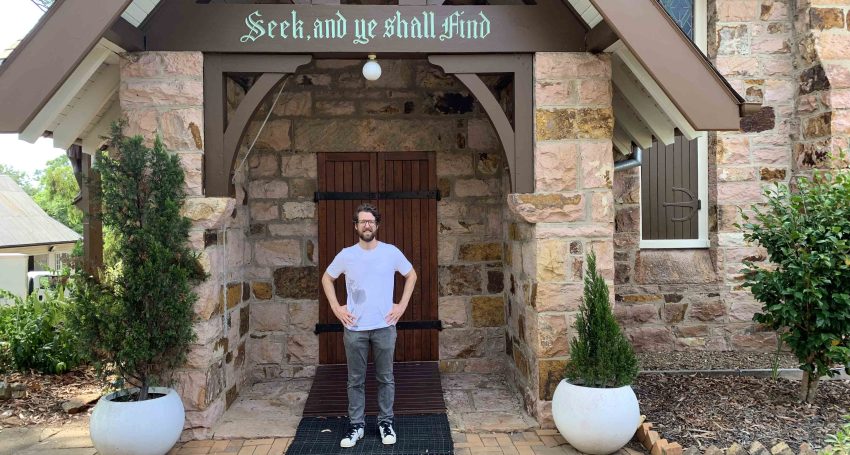Liturgy: Making God our home
Reflections
“Liturgy, then, is not first and foremost about prayer books, or rituals, or religious spaces. All of these things are meant to make audible and visible a reality that is not captured or exhausted by any of them, namely, God’s love for our embodied existence – for our flesh. The challenge of enacting liturgy is to make God’s love tangible amidst actual people and the concreteness of their lived lives,” says Dr Peter Kline from St Francis College

One of my teachers in seminary used to say that what finally compelled her into the Christian faith is its proclamation of the presence of God at the extremes of human existence – at birth and death.
At Christmas, Christians celebrate with wonder that God is born, and on Good Friday, Christians contemplate the awe-full mystery that God dies. Easter is the celebration that God’s entrance into the extremes of human existence is not confined to the past, but is present for us now as God’s loving embrace of the entire sweep of creaturely life.
What compelled my teacher is how the Christian proclamation of God-with-us in Jesus is an enfleshed answer to the psalmist’s question: “where can I flee from your presence?” (Psalm 139.7). The answer is “nowhere”. All of life, its ordinary and extraordinary transitions, its moments of joy and devastation, its processes of growth and decay, finds a home within the life of God.
The question for those of us who bear witness to the Gospel in Christian communities is how to give concrete form to this “nowhere”. How do we make real for people the reality that God is with us at each step of the human journey? The short answer is through “liturgy”.
Liturgy is the work of making God our home – God having first made a home with us. Liturgy is how we make time and space to dwell within the time and space God has made with us. Liturgy, then, is not first and foremost about prayer books, or rituals, or religious spaces. All of these things are meant to make audible and visible a reality that is not captured or exhausted by any of them, namely, God’s love for our embodied existence – for our flesh. The challenge of enacting liturgy is to make God’s love tangible amidst actual people and the concreteness of their lived lives.
Advertisement
One of the most meaningful liturgical moments of my life was a simple blessing and prayer that two friends spoke over my son a few days after he was born. Leo was born eight weeks premature and had to spend a month in the special care hospital nursery before coming home. Hospitals have their own liturgies, their own ways of marking time and space that make it possible for people to dwell and belong and receive care. In a special care nursery, the liturgies are, of course, “medical”, but they are also the liturgies of everyday life with infants: feeding, bathing, clothing, holding, singing, worrying, laughing, crying. About two weeks into our stay in the special care nursery, my friends arrived at the nursery, donned the proper PPE vestments, undertook the ritual handwashing, and offered a simple blessing and prayer of thanksgiving for Leo’s birth.
It was a very simple gesture on one level, but it also witnessed to what I take to be the point of all Christian liturgy, namely, to make it seen, heard, and felt that, wherever people are, whatever their circumstances, a home with God can be made here.
Christian liturgy does not require “religious” spaces or settings, even if creating such spaces is one of the things it does. Nor does Christian liturgy need to compete with or displace other liturgies, such as the liturgies of a hospital, or the liturgies of other faith communities.
Advertisement
The reason is because a Christian approach to liturgy is rooted not in the separateness of “religion” over or against “the world”, but in God’s joining us in the flesh. God’s birth and God’s death, which took place outside of the bounds of self-enclosed and self-justifying religious meaning, make the time and space of our ordinary, messy lives the site of our embrace by God.
The challenge for Christian communities, then, is to show in concrete ways, in the lives of actual people, how no corner of life is left unwelcomed into God who, even at the extremes of our lives, is our home.
Editor’s note: If you found this feature interesting and you would like to know more about studying theology at St Francis College or about the Semester 1 2023 subject ‘DL3001Z / DL9031Z: From Birth to Death: Life, Loss and Liturgy’, please visit the St Francis College website or contact the College Registrar, Dr Sheilagh O’Brien, on 07 5514 7403 or sheilagh.obrien@anglicanchurchsq.org.au.






